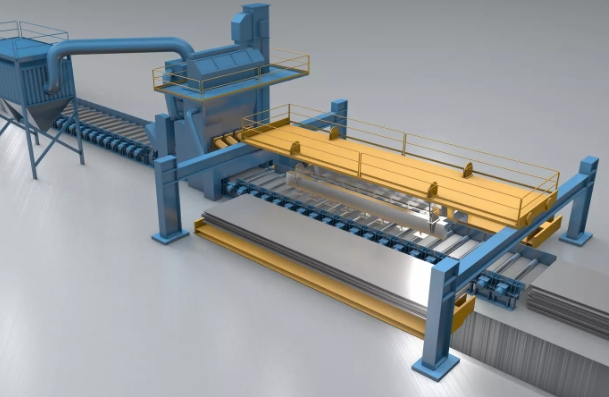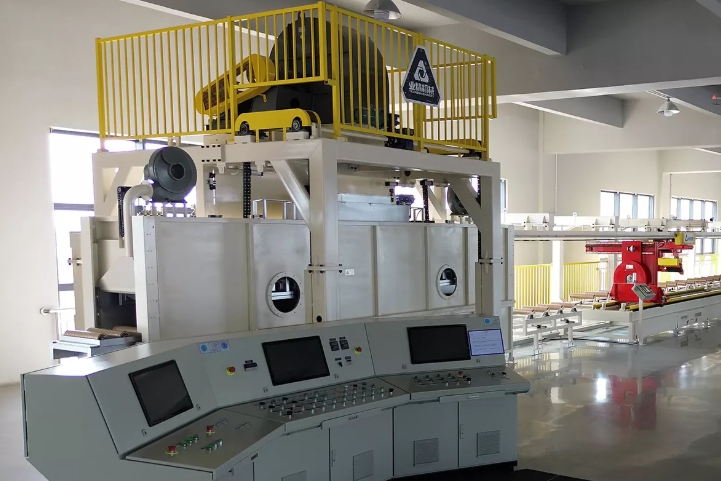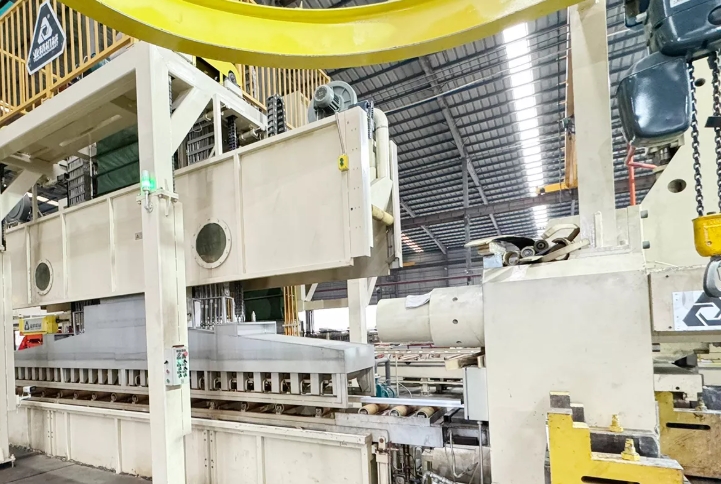Content Menu
● What is a Quenching System?
● The Importance of Quenching in Industrial Processes
● Types of Quenching Systems
>> Water Quenching Systems
>> Oil Quenching Systems
>> Polymer Quenching Systems
>> Gas Quenching Systems
>> Salt Bath Quenching Systems
● Key Features of Modern Quenching Systems
● Top Quenching System Manufacturers and Suppliers in the UK
>> Northern Combustion Systems (NCS)
>> Therser UK
>> Durferrit UK
>> Aalberts Surface Technologies Letchworth
>> Air Products UK
>> CIMCOOL UK
● OEM and Custom Quenching Solutions
● How to Choose the Right Quenching System Supplier
● Trends and Innovations in Quenching System Technology
● Conclusion
● Frequently Asked Questions
>> 1. What are the main types of quenching systems used in the UK?
>> 2. How do I choose the right quenching medium for my application?
>> 3. What certifications should I look for in a quenching system supplier?
>> 4. Can UK quenching system suppliers provide OEM or custom solutions?
>> 5. What are the latest trends in quenching system technology?
Quenching systems are a cornerstone of modern industrial heat treatment, playing a pivotal role in achieving the desired mechanical properties of metals such as steel and aluminum. As global industries continue to demand higher performance and more reliable materials, the importance of advanced quenching systems has grown exponentially. The United Kingdom, with its rich history in metallurgy and engineering, is home to some of the world's leading quenching system manufacturers and suppliers. These companies serve a diverse range of industries, including automotive, aerospace, energy, and general engineering, providing both standard and custom solutions for international brand owners, wholesalers, and manufacturers.
This comprehensive guide delves into the world of quenching system manufacturers and suppliers in the UK, exploring their technologies, capabilities, and the latest trends shaping the industry. Whether you are an OEM, a production manager, or a procurement specialist seeking reliable partners, this article will equip you with the knowledge to make informed decisions.

What is a Quenching System?
A quenching system is an engineered setup designed to rapidly cool heated metal components by immersing or exposing them to a quenching medium such as water, oil, polymer solutions, or gases. The rapid cooling process is essential for altering the microstructure of metals, resulting in improved hardness, strength, and wear resistance. Quenching is a critical step in the heat treatment cycle, often following processes such as austenitizing or solutionizing.
The effectiveness of a quenching system depends on several factors, including the choice of quenching medium, agitation method, temperature control, and the ability to handle different part sizes and geometries. Modern quenching systems are equipped with advanced controls and automation to ensure consistent and repeatable results.
The Importance of Quenching in Industrial Processes
Quenching is not merely a cooling step; it is a scientifically controlled process that determines the final properties of metal components. The importance of quenching in industrial manufacturing includes:
- Enhancing Mechanical Properties: Proper quenching increases hardness, tensile strength, and fatigue resistance, making components suitable for demanding applications.
- Controlling Microstructure: By managing the cooling rate, manufacturers can achieve the desired balance between hardness and toughness.
- Reducing Distortion and Cracking: Advanced quenching systems minimize thermal gradients, reducing the risk of warping or cracking in complex parts.
- Improving Surface Quality: Controlled quenching can enhance surface finish and reduce the need for post-processing.
- Meeting Industry Standards: Many sectors, such as aerospace and automotive, require strict adherence to international standards for heat treatment and quenching.
Types of Quenching Systems
The choice of quenching system is dictated by the material being treated, the required properties, and the production environment. The main types include:
Water Quenching Systems
Water is the most aggressive quenching medium, offering rapid heat extraction. It is ideal for carbon steels but can cause distortion or cracking in alloy steels and complex geometries. Modern water quenching systems often feature agitation and temperature control to improve uniformity and reduce thermal shock.
Oil Quenching Systems
Oil quenching provides a slower cooling rate compared to water, reducing the risk of distortion and cracking. Oil is commonly used for alloy steels, gears, and shafts. Oil quenching systems are designed with filtration, agitation, and temperature management to ensure consistent results and extend oil life.
Polymer Quenching Systems
Polymer solutions offer adjustable cooling rates by varying the concentration of polymer in water. This flexibility allows manufacturers to tailor the quenching process to specific alloys and part geometries. Polymer quenching is increasingly popular in the aerospace and precision engineering sectors due to its balance of speed and control.
Gas Quenching Systems
Gas quenching, typically using nitrogen, argon, or helium, is employed in vacuum furnaces for high-value components. Gas quenching is clean, reduces oxidation, and minimizes distortion, making it ideal for aerospace and medical applications. These systems require high-pressure blowers and advanced controls.
Salt Bath Quenching Systems
Salt baths provide uniform heat transfer and are used for specialized alloys and processes. The molten salt medium allows for precise temperature control and minimal distortion. Salt bath quenching is common in tool making and aerospace applications.
Key Features of Modern Quenching Systems
Today's quenching system manufacturers and suppliers in the UK offer advanced features to meet the evolving needs of industry:
- Automated Process Control: PLCs and SCADA systems enable precise control over temperature, agitation, and timing.
- Energy Efficiency: Modern systems are designed to minimize energy consumption and environmental impact.
- Integrated Safety Systems: Features such as fire suppression, leak detection, and emergency shutdown are standard.
- Customizable Designs: Tanks, furnaces, and agitation systems can be tailored to specific production requirements.
- Data Logging and Traceability: Essential for quality assurance and compliance with industry standards.
Top Quenching System Manufacturers and Suppliers in the UK
Northern Combustion Systems (NCS)
Northern Combustion Systems is a leader in the design, manufacture, and installation of advanced quenching systems. NCS specializes in both gas and electric furnace-based quenching solutions, focusing on energy efficiency, automation, and precise temperature control. Their systems are widely used in automotive, aerospace, and general engineering sectors.
NCS offers customizable tank sizes, variable frequency drives for pump control, and seamless integration with automated production lines. Their commitment to innovation and customer support has made them a preferred partner for OEMs and manufacturers seeking reliable quenching solutions.
Therser UK
Therser UK is renowned for its Seal Quench Furnaces, available in both gas-fired and electrically heated models. These systems are designed for high throughput, low maintenance, and automated operation. Therser's quenching solutions meet rigorous industry standards such as AMS 2750G, making them a top choice for aerospace and automotive applications.
Therser offers a wide range of load capacities, automated loading and unloading, and integrated process control systems. Their expertise in custom furnace and quenching system design allows them to address the unique needs of each client.
Durferrit UK
Durferrit UK, a subsidiary of the global HEF Groupe, is a leading supplier of heat treatment salts and salt bath equipment. Their quenching systems utilize molten salt baths for specialized applications, providing uniform heat transfer and precise temperature control.
Durferrit serves OEMs and heat treatment contractors in automotive, aerospace, and oil & gas industries. They offer a comprehensive range of heat treatment salts and custom salt bath quenching systems, supported by technical expertise and process development services.
Aalberts Surface Technologies Letchworth
Aalberts Surface Technologies operates one of the UK's most advanced heat treatment facilities, offering both gas and oil quenching furnaces. Their services cater to industries with stringent quality requirements, such as aerospace, motorsport, and medical devices.
Aalberts holds certifications like Nadcap and AS9100, ensuring the highest process standards. Their capabilities include state-of-the-art vacuum and atmospheric furnaces, rapid turnaround for urgent orders, and full-service logistics and technical support.
Air Products UK
Air Products is a global leader in industrial gases, providing comprehensive quenching solutions using nitrogen, argon, and helium. Their gas quenching systems are valued for producing clean surfaces, minimizing distortion, and improving safety by eliminating oil-based quenchants.
Air Products offers customizable gas blends, on-site process optimization, and safety training. Their global supply chain and technical expertise make them a reliable partner for manufacturers seeking advanced gas quenching solutions.
CIMCOOL UK
CIMCOOL UK, part of DuBois Chemicals, supplies a wide range of oil-based and water-based quenching fluids engineered for the latest European standards. Their products are designed to maximize bath life, minimize distortion, and ensure predictable performance.
CIMCOOL's technical team assists customers in selecting the right quenchant for their process needs, offering enhanced corrosion protection, fluid stability, and a commitment to sustainability and workplace safety.

OEM and Custom Quenching Solutions
Many quenching system manufacturers and suppliers in the UK offer OEM and custom solutions tailored to the unique needs of international brand owners, wholesalers, and manufacturers. These services include:
- Bespoke System Design: Custom tank and furnace configurations to accommodate specific part sizes, production volumes, and process requirements.
- Automation Integration: Seamless integration with existing production lines, including robotics, conveyors, and data management systems.
- Advanced Process Control: Customizable control systems for precise monitoring and adjustment of quenching parameters.
- Turnkey Installation: Comprehensive project management from design and manufacturing to installation, commissioning, and training.
- After-Sales Support: Ongoing maintenance, technical support, and process optimization services to ensure long-term performance.
OEM and custom quenching solutions are particularly valuable for companies with unique production challenges or those seeking to differentiate their products through advanced heat treatment capabilities.
How to Choose the Right Quenching System Supplier
Selecting the right quenching system manufacturer or supplier is a critical decision that can impact product quality, production efficiency, and long-term competitiveness. Key considerations include:
- Technical Expertise: Evaluate the supplier's experience with your specific materials, processes, and industry requirements.
- Certifications and Compliance: Ensure the supplier holds relevant certifications such as Nadcap, AS9100, or ISO 9001, and can meet customer-specific standards.
- Customization Capability: Assess the supplier's ability to design and deliver bespoke solutions tailored to your needs.
- After-Sales Support: Look for comprehensive support services, including training, maintenance, and process optimization.
- Innovation and Technology: Choose suppliers who invest in the latest automation, energy efficiency, and process monitoring technologies.
- Global Reach: For international operations, select suppliers with a proven track record of supporting global customers and logistics.
Trends and Innovations in Quenching System Technology
The field of quenching system manufacturing is evolving rapidly, driven by the demands of modern industry and advances in technology. Key trends include:
- Increased Automation: The integration of robotics, automated loading/unloading, and real-time process monitoring is becoming standard, improving consistency and reducing labor costs.
- Energy Efficiency: Manufacturers are adopting energy-efficient designs, heat recovery systems, and environmentally friendly quenching media to reduce operating costs and environmental impact.
- Advanced Process Control: The use of PLCs, SCADA, and IoT-enabled sensors allows for precise control, data logging, and traceability, essential for quality assurance and regulatory compliance.
- Sustainability: There is a growing emphasis on reducing waste, recycling quenching media, and minimizing the use of hazardous substances.
- Customization and Flexibility: As product cycles shorten and demand for specialized materials increases, suppliers are offering more flexible and customizable quenching solutions.
Conclusion
The United Kingdom stands at the forefront of quenching system manufacturing, offering a diverse range of technologies and services to meet the needs of global industries. From traditional water and oil quenching systems to advanced gas and salt bath solutions, UK manufacturers and suppliers provide the expertise, innovation, and reliability required for modern heat treatment operations.
Whether you are an international brand owner, wholesaler, or manufacturer seeking OEM services or custom solutions, the UK's top quenching system manufacturers and suppliers are well-equipped to support your business. By understanding the types of quenching systems, key features, and selection criteria, you can make informed decisions that enhance your production capabilities and ensure the highest quality standards.

Frequently Asked Questions
1. What are the main types of quenching systems used in the UK?
The most common types include water, oil, polymer, gas, and salt bath quenching systems. Each type is suited to specific metals and desired properties, with UK suppliers offering advanced solutions for all major industries.
2. How do I choose the right quenching medium for my application?
Selection depends on the alloy, required microstructure, and part geometry. Water provides the fastest cooling, oil reduces distortion, polymer offers adjustable rates, and gas quenching is best for clean, high-value parts.
3. What certifications should I look for in a quenching system supplier?
Look for industry certifications such as Nadcap (for aerospace), AS9100, ISO 9001, and compliance with customer-specific standards, especially if you serve regulated industries.
4. Can UK quenching system suppliers provide OEM or custom solutions?
Yes, many leading UK suppliers offer OEM and custom-designed systems, including integration with automation and tailored process control, to meet the unique needs of international clients.
5. What are the latest trends in quenching system technology?
Key trends include increased automation, energy efficiency, advanced process monitoring, the adoption of environmentally friendly quenching media, and greater customization to support specialized manufacturing needs.






















